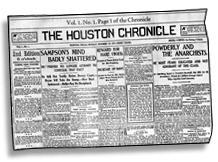 Image via Wikipedia
Click here to go to Wikipedia article
Image via Wikipedia
Click here to go to Wikipedia article
Animal Farm and much of the other writing by George Orwell are examples of this kind of writing.
A
dystopia (from
Ancient Greek:
δυσ-, "bad, hard",
[1] and
Ancient Greek:
τόπος, "place, landscape";
[2] alternatively
cacotopia,
[3][4] or
anti-utopia) is the idea of a society in a repressive and controlled state, often under the guise of being
utopian, as characterized in books like
Brave New World,
Nineteen Eighty-Four, and more recently,
The Hunger Games. Dystopian societies feature different kinds of repressive social control systems, various forms of active and passive coercion. Ideas and works about dystopian societies often explore the concept of humans abusing technology and humans individually and collectively coping, or not being able to properly cope with technology that has progressed far more rapidly than humanity's spiritual evolution. Dystopian societies are often imagined as
police states, with unlimited power over the citizens.
Etymology
The first known use of
dystopian, as recorded by the
Oxford English Dictionary, is a speech given before the
British House of Commons by
John Stuart Mill in 1868, in which Mill denounced the government's Irish land policy: "It is, perhaps, too complimentary to call them Utopians, they ought rather to be called dys-topians, or caco-topians. What is commonly called Utopian is something too good to be practicable; but what they appear to favour is too bad to be practicable."
[6][7][8][9]
Counter-utopia, anti-utopia
 Cover of Brave New World
Cover of Brave New WorldMany dystopias found in fictional and artistic works present a
utopian society with at least one
fatal flaw,
[10] whereas a
utopian society is founded on the good life, a dystopian society’s dreams of improvement are overshadowed by stimulating fears of the "ugly consequences of present-day behavior."
[11] People are alienated and individualism is restricted by the government. An early example of a dystopian novel is
Rasselas (1759), by Samuel Johnson, set in Ethiopia.
Society
In the novel
Brave New World, by
Aldous Huxley, the class system is prenatally designated in terms of Alphas, Betas, Gammas, Deltas, and Epsilons. In
We, by
Yevgeny Zamyatin, people are permitted to live out of public view for only an hour a day. They are not only referred to by numbers instead of names, but are neither "citizens" nor "people", but "ciphers". In the lower castes, in
Brave New World, single embryos are "
bokanovskified", so that they produce between eight and ninety-six identical siblings, making the citizens as uniform as possible.
[12]Some dystopian works emphasize the pressure to conform in terms of a requirement not to excel. In these works, the society is ruthlessly egalitarian, in which ability and accomplishment, or even competence, are suppressed or stigmatized as forms of inequality, as in
Kurt Vonnegut's
Harrison Bergeron. Similarly, in
Ray Bradbury's
Fahrenheit 451, the dystopia represses the intellectuals with particular force, because most people are willing to accept it, and the resistance to it consists mostly of intellectuals.
[13]]Social groups
Concepts and symbols of religion may come under attack in a dystopia. In
Brave New World, for example, the establishment of the state included lopping off the tops of all crosses (as symbols of Christianity) to make them "T"s, (as symbols of
Henry Ford's Model T).
[14] But compare
Margaret Atwood's
The Handmaid's Tale, wherein a Christianity-based theocratic regime rules the future United States.
[15]In some of the fictional dystopias, such as
Brave New World and
Fahrenheit 451, the family has been eradicated and continuing efforts are deployed to keep it from reestablishing itself as a social institution. In
Brave New World, where children are reproduced artificially, the concepts "mother" and "father" are considered obscene. In some novels, the State is hostile to motherhood: for example, in
Nineteen Eighty-Four, children are organized to spy on their parents; and in
We, the escape of a pregnant woman from OneState is a revolt.
[16]
Nature
Fictional dystopias are commonly urban and frequently isolate their characters from all contact with the natural world.
[17] Sometimes they require their characters to avoid nature, as when walks are regarded as dangerously
anti-social in
Ray Bradbury's
Fahrenheit 451.
[citation needed] In
Brave New World, the lower classes of society are conditioned to be afraid of nature, but also to visit the countryside and consume transportation and games to stabilize society.
[citation needed] A few "green" fictional dystopias do exist, such as in
Michael Carson's short story "
The Punishment of Luxury", and
Russell Hoban's
Riddley Walker. The latter is set in the aftermath of nuclear war, "a post-nuclear holocaust Kent, where technology has reduced to the level of the Iron Age"
[18][citation needed] In The
Hunger Games people are seperated by fences, it is advised not to go into the woods, but, no-one seems to enforce this law (at least not in District 12) as the lead character, Katniss can easily go into the woods and hunt for food, though it is mentioned that their are several mutated beasts out there, Katniss hardly ever comes across them in the wild, apart from the harmless mockingjay (a cross between a
Mocking bird and a
Blue jay).
Politics
Whereas the political principles at the root of fictional utopias (or "perfect worlds") are
idealistic in principle, intending positive consequences for their inhabitants,
[21] the political principles on which fictional dystopias are based are flawed and result in negative consequences for the inhabitants of the dystopian world, which is portrayed as
oppressive.
[10]Dystopias are often filled with
pessimistic views of the ruling class or government that is brutal or uncaring ruling with an "iron hand" or "iron fist".
[citation needed] These dystopian government establishments often have protagonists or groups that lead a "
resistance" to enact change within their government.
[22]
Economics
The economic structures of dystopian societies in literature and other media have many variations, as the economy often relates directly to the elements that the writer is depicting as the source of the oppression. However, there are several
archetypes that such societies tend to follow.
A commonly occurring theme is that the
state plans the economy, as shown in such works as
Ayn Rand's
Anthem and
Henry Kuttner's short story
The Iron Standard. A contrasting theme is where the planned economy is planned and controlled by corporatist and fascist elements. A prime example of this is reflected in Noman Jewison's 1975
Rollerball film. Some dystopias, such as
Nineteen Eighty-Four, feature
black markets with goods that are dangerous and difficult to obtain, or the characters may be totally at the mercy of the state-controlled economy. Such systems usually have a lack of efficiency, as seen in stories like
Philip Jose Farmer's
Riders of the Purple Wage, featuring a bloated welfare system in which total freedom from responsibility has encouraged an underclass prone to any form of antisocial behavior.
Kurt Vonnegut's
Player Piano depicts a dystopia in which the centrally controlled economic system has indeed made material abundance plentiful, but deprived the mass of humanity of meaningful labor; virtually all work is menial and unsatisfying, and only a small number of the small group that achieves education is admitted to the elite and its work.
[23]Even in dystopias where the economic system is not the source of the society's flaws, as in
Brave New World, the state often controls the economy. In
Brave New World, a character, reacting with horror to the suggestion of not being part of the social body, cites as a reason that everyone works for everyone else.
[24]Other works feature extensive
privatization and
corporatism, where privately owned and unaccountable large corporations have effectively replaced the government in setting policy and making decisions. They manipulate, infiltrate, control, bribe, are contracted by, or otherwise function as government. This is seen in the novel
Jennifer Government and the movies
Alien, Robocop, Max Headroom, Soylent Green, THX 1138,
WALL-E and
Rollerball. Rule-by-corporation is common in the
cyberpunk genre, as in
Philip K. Dick's
Do Androids Dream of Electric Sheep? (made into the movie
Blade Runner) and
Snow Crash'.
Caste systems
Further information:
caste
In Nineteen Eighty-Four, for example, the Inner Party, the upper class of society, also has a standard of living that at least appears lower than the upper classes of today.[citation needed]In dystopian literature the advanced technology is controlled exclusively by the group in power, while the oppressed population is limited to technology comparable to or more primitive than what we have today. In order to emphasize the degeneration of society, the standard of living among the lower and middle classes is generally poorer than that of their equivalents in contemporary industrialized society.
In contrast to
Nineteen Eighty-Four, in
Brave New World and
Equilibrium, people enjoy much higher material living standards in exchange for the loss of other qualities in their lives, such as independent thought and emotional depth.
[citation needed]In
Ypsilon Minus by
Herbert W. Franke, people are divided into numerous alphabetically ranked groups. Similarly, in
Brave New World, people are divided into castes ranging from Alpha-Plus to Epsilon, with the lower classes having reduced brain function and conditioning to make them satisfied with their position in life.
 Discusss
Discusss











